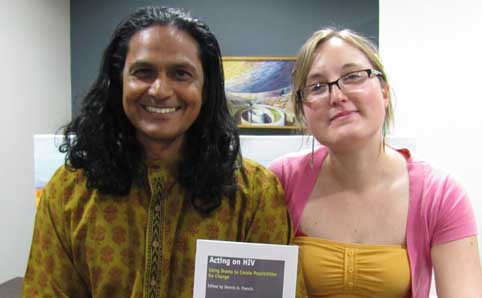 |
|
Prof. Dennis Francis with Marjorie Human who designed the cover of the book, Acting on HIV.
|
The HIV pandemic has brought out the best and worst in humans in terms of response. On the one hand it has prompted stigma and violence and on the other it has brought about constructive and supportive responses from various individuals and groups. A new book, Acting on HIV, edited by Prof. Dennis Francis, Dean of the Faculty of Education at the University of the Free State, looks at how drama can be used to promote vital social change as well as individual behavioural change.
Acting on HIV offers a systematic inquiry into drama as an approach to discuss HIV/AIDS and related attitudes and behaviours. The book is a scholarly text and includes the work of some twenty exceptionally creative authors. Contributing authors to the book include, amongst others, Proff. Hazel Barnes (University of the Witwatersrand), Rob Pattman (Stellenbosch University) and Yvonne Sliep from the University of KwaZulu-Natal.
“This project started in 2009 and has taken much of my time to bring together the work of exceptionally creative authors. The research that is communicated through the book is original and timely and makes a significant contribution to conversations about the role/s and significance of drama in addressing issues of HIV & AIDS,” says Prof. Francis.